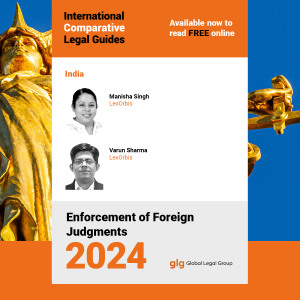 1. Country Finder
1. Country Finder
1.1 Please set out the various regimes applicable to recognising and enforcing judgments in your jurisdiction and the names of the countries to which such special regimes apply.
| Applicable Law/Statutory Regime | Relevant Jurisdiction(s) | Corresponding Section Below |
| India is not part of any regime or convention on enforcement of foreign judgments. | Not applicable. | Not applicable. |
| Reciprocating bilateral agreements: India has executed bilateral treaties with various countries with respect to reciprocal arrangements in the enforcement of judgments and decrees. | Aden, Bangladesh, the Cook Islands (including Niue), Fiji, Hong Kong, the Federation of Malaya, New Zealand, Papua New Guinea, the Republic of Singapore, Trinidad and Tobago, the Trust Territories of Western Samoa, the United Arab Emirates, and the United Kingdom. | Sections 13 and 44-A of the CPC. |
| General regime: Code of Civil Procedure, 1908 (CPC). | All countries with which bilateral agreements have not been executed. | Sections 13 and 44-A of the CPC. |
2. General Regime
2.1 Absent any applicable special regime, what is the legal framework under which a foreign judgment would be recognised and enforced in your jurisdiction?
Section 44-A, read with Section 13 of the CPC, governs the recognition and enforcement of foreign judgments and decrees in India. A foreign judgment which does not fall under the exceptions given in Section 13 of the CPC can be enforced by instituting execution proceedings under Section 44-A in case of reciprocating territories. If the judgment has not originated from a reciprocating territory, such foreign judgment can be enforced by instituting a civil suit on the judgment.
2.2 What constitutes a ‘judgment’ capable of recognition and enforcement in your jurisdiction?
Any judgment which is “conclusive” as to any matter directly adjudicated upon, between the same parties or between parties, of which they or any of them claim under the same title, is capable of recognition and enforcement in India. The law on foreign judgments in India does not specify the types of judgments regarded as “conclusive”. Rather, Section 13 provides the types of judgments that are not considered conclusive and, thus, are precluded from enforcement. The following judgments are not conclusive:
- where a court of competent jurisdiction has not pronounced the judgment;
- where it has not been given on the merits of the case;
- where it appears on the face of the proceedings to be founded on an incorrect view of international law or a refusal to recognise the law of India in cases in which such law is applicable;
- where the proceedings in which the judgment was obtained are opposed to natural justice;
- where it has been obtained by fraud; and
- where it sustains a claim founded on a breach of any law in force in India.
From the various decisions of courts in India, interlocutory orders on costs, jurisdiction, divorce decrees, monetary judgments, mandatory injunctions and anti-suit injunctions are enforceable in India. Even ex parte decisions are enforceable if the trial procedure has been followed and the judgment holder has proven its case without a defence.
On the other hand, default judgments, judgments from summary or special procedures, formal judgments and judgments imposing punitive damages and penalties or quasi-judicial orders are considered unenforceable in India.
To read more visit the Chapter first published by: ICLJ.com here
Authors: Manisha Singh and Varun Sharma



